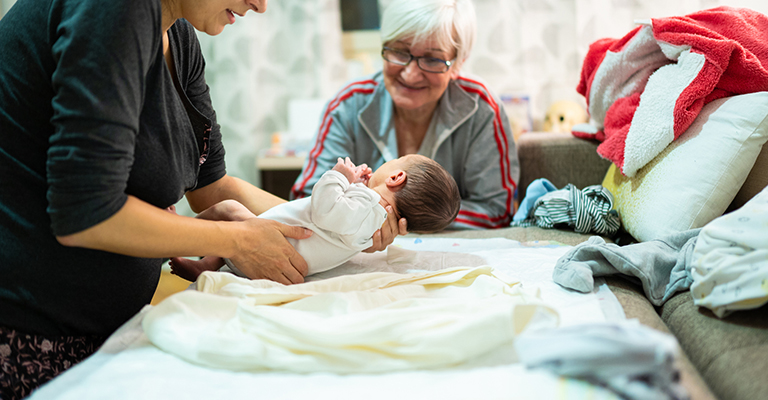Updated by the Progyny Clinical Team — September 2025.
Becoming a parent is a major life change. Whether you are a first-time parent or welcoming another child, it can take time to adjust to life with a new baby.
Hormonal changes after birth
After childbirth, your hormone levels shift rapidly, and these changes affect both your body and your emotions. Oxytocin and endorphins often rise, which can strengthen bonding and help reduce stress. At the same time, estrogen and progesterone drop sharply once the placenta is delivered.
These dramatic changes play a major role in your physical recovery and mood. They can contribute to common experiences like the “baby blues” and, in some cases, more serious mood disorders that may appear later in the postpartum period.
Baby blues
For many new parents, the first sign of these hormonal shifts is the “baby blues.” This short-term condition is very common, affecting up to 80% of people who give birth. Symptoms may include mood swings, crying spells, and anxiety. While unsettling, these feelings usually fade on their own within about two weeks.
Postpartum depression
If emotional changes are more intense, last longer, or interfere with daily life, they may signal postpartum depression. About 1 in 8 women experience this condition, and rates can be higher among transgender and nonbinary parents or anyone with a history of depression.
Postpartum depression often shows up as persistent sadness, anxiety, or despair that makes it hard to function. Unlike the baby blues, it doesn’t resolve on its own and can start any time in the first year after delivery. Talking with your healthcare provider is the best way to confirm what’s happening and get the right support and treatment.
Postpartum psychosis
In rare cases, hormonal and emotional changes can lead to postpartum psychosis, which affects about 1 to 2 in 1,000 births. This serious condition may cause hallucinations, delusions, or severe confusion. Because symptoms can appear suddenly and escalate quickly, postpartum psychosis is considered a medical emergency and requires immediate care.
Physical recovery
While emotions are shifting, your body is also healing from delivery. Whether vaginal or cesarean, recovery can bring pain or discomfort, and sleep deprivation can make these challenges feel harder. If discomfort is prolonged or prevents you from daily tasks, speak with your provider about ways to manage it safely.
Healing and support
Hormonal changes, pain, and lack of sleep all influence postpartum mental health. With time, medical care, and emotional support, most people begin to feel better. Recovery looks different for everyone, so give yourself patience and grace — healing after childbirth takes time.
Adjusting to life with a new baby
In the weeks and months after delivery, many physical symptoms improve, and your body may start to feel more like itself. But recovery is more than physical — caring for a newborn is mentally and emotionally demanding, especially if this is your first time.
Here are some steps that can help:
- Give yourself time to adjust. It can take weeks or months to settle into your new role. If you have older children, they will need time to adjust, too. It’s normal to miss parts of your old routine or struggle to feel like yourself.
- Take care of yourself. Prioritizing rest, nourishing foods, and movement (as recommended by your provider) supports both recovery and mental health.
- Lean on your support system. Parenting can feel isolating. Reach out to family, friends, or other parents. Accept help from those you trust — whether that’s watching the baby for an hour or bringing a meal.
Every postpartum experience is different. Whether this is your first child or your third, you may face new highs and lows. During this transition, give yourself compassion, ask for help when you need it, and take things one day at a time.
Support is available
Emergency support
If you are in mental health distress or having thoughts of suicide, call 911 or dial 988 to connect with the Suicide and Crisis Lifeline.
Non-emergency support
The National Maternal Mental Health Hotline is available 24/7. Call or text 1-833-TLC-MAMA (1-833-852-6262) for free, confidential support in English and Spanish, with interpreters available in more than 60 languages. The American College of Obstetricians and Gynecologists also offers helpful videos.
Progyny is here for you, too. Please contact your Progyny Care Advocate for support.
Disclaimer: The information provided by Progyny is for educational purposes only and is not medical advice. Always consult a qualified healthcare provider for medical guidance.
